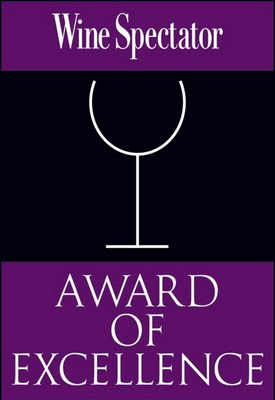 A couple years ago, The New York Times writer Amanda Hester noticed that it wasn’t real tough for restaurants to get a wine list “Award of Excellence” from Wine Spectator magazine. I want to mention it here because it illustrates a point that needs making when you’re thinking about what wine to order in a restaurant (or in a retail store for that matter), and why.
A couple years ago, The New York Times writer Amanda Hester noticed that it wasn’t real tough for restaurants to get a wine list “Award of Excellence” from Wine Spectator magazine. I want to mention it here because it illustrates a point that needs making when you’re thinking about what wine to order in a restaurant (or in a retail store for that matter), and why.Hester wrote: “…with such a large number of winners, perhaps competition is too strong a word. Of the 3,360 awards granted this year, from a pool of 3,573 entrants, 2,808 received the basic award. Only the winners of the Grand Award, the magazine’s top award, of which there are 89 this year, are ever inspected; 3,271 restaurants simply sent in copies of their wine lists and menus, a cover sheet describing their wine programs and a check for $175 – and walked away winners.” This means that 94% of the applicants got a Wine Spectator award on some level. Fast forward to 2008. The entrance fee was $250, and more than 4000 restaurants “earned” the award. And Wine Spectator, uh, booked more than a million in fees.
Ironically, though, this really isn’t the scandal I’m referring to.
That was the work of one Robin Goldstein, a wine blogger and writer who manufactured a nonexistent restaurant in Milan, Italy, paid the fee and “won” an award. Frankly, it doesn’t really bother me, and it shouldn’t bother you too much. And to be fair to Wine Spectator, Goldstein put a lot of work into his little scam – he built a website, created a extensive menu and wine list, and even established a working Milan phone and fax number as required by the application. Who wouldn’t have been fooled unless they showed up to discover the place didn’t exist?
For its part, Wine Spectator did call the restaurant to verify the information, and left a voicemail (although the voicemail was after the “award” and it was a sales pitch for an ad). Had I been preparing to visit Milan, and run across his website, I might have made reservations at his non-existent establishment myself. And you might conclude that the fictional Osteria l’Intrepido restaurant’s award was an exception, and the result of an elaborate scam. And you might further still think that a Wine Spectator Award of Excellence still represents, oh, I don’t know, maybe good value, wide selection, and good pairing opportunities with things on the menu. After all, they’re still conferred by experts at one of the world’s leading wine consumer publications, right?
Wrong. All it really means, in most cases, is that the restaurant paid the price of admission and sent in some paperwork.
The lesson here? Don’t depend on others to tell you what to drink – not Parker, not Broadbent, not me, not Wine Spectator or Wine Enthusiast, not your neighbor. It’s ok to read reviews but remember they are someone else’s taste buds and someone else’s opinion. Instead, learn the basics and then enjoy the experience of tasting wines and thinking critically about why you like them, and how to pair them up with the foods you like. And before you head to a restaurant, do a little homework. As homework goes, it’s not as bad as digging ditches.
Wine Spectator is a good mag, with interesting, thoughtful articles and fabulous photography. I read it myself. But I make up my mind about which wines I’ll taste and buy on my own.
And frankly, too, this isn’t that big a deal, warranting great outrage, is it? We’ve got military men and women dying in Iraq and Afghanistan. An economy still in the toilet. And people still losing their houses, jobs and health insurance daily.
Wine is supposed to be about fun.

Recent Comments